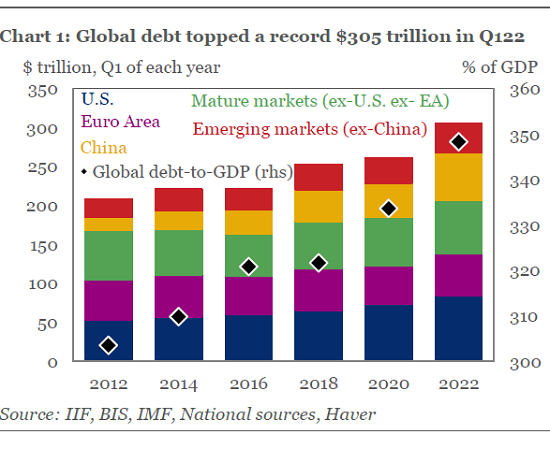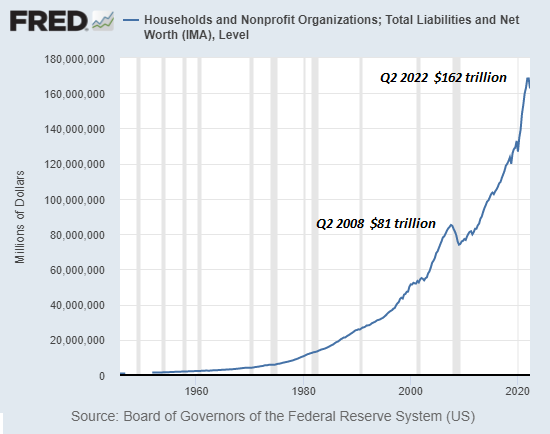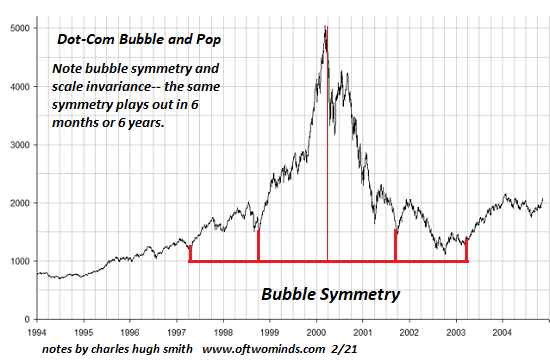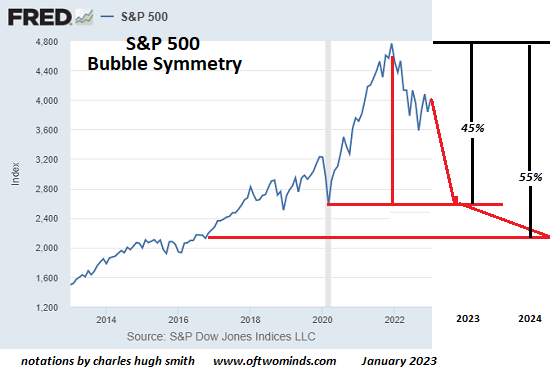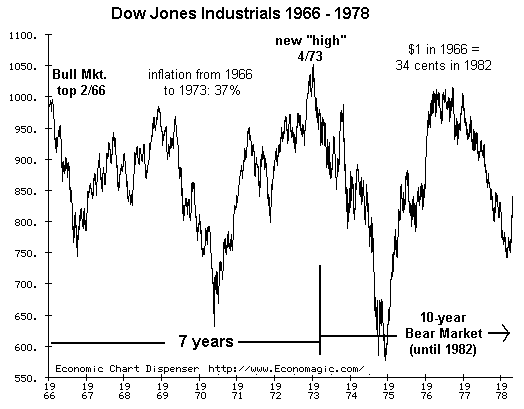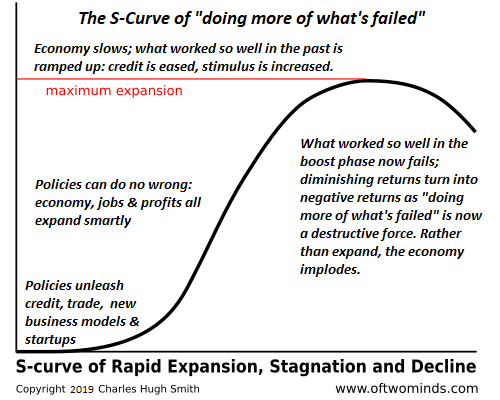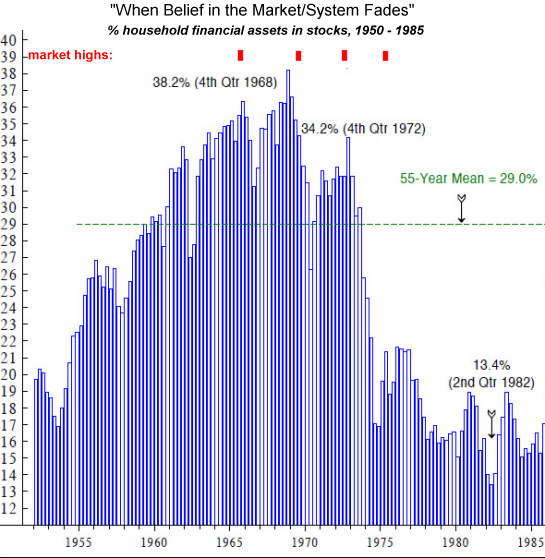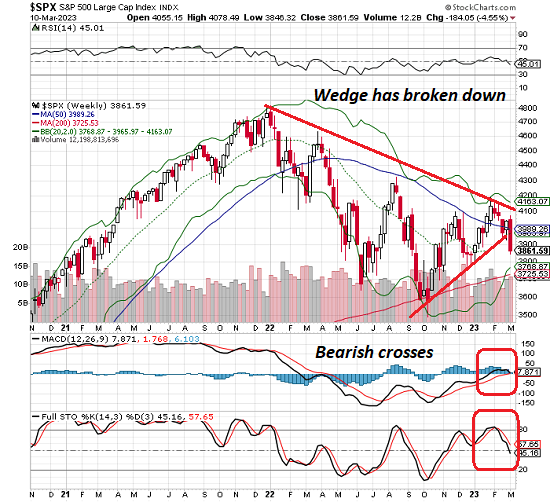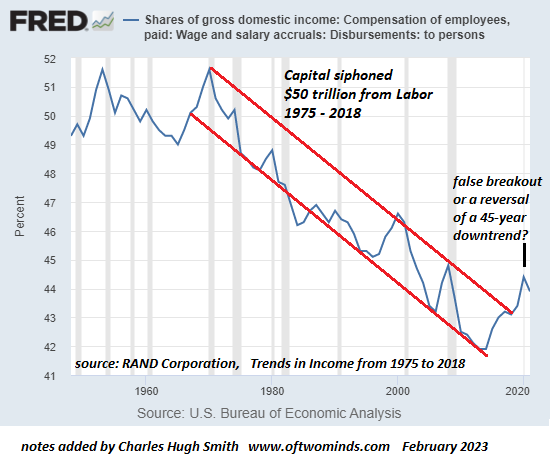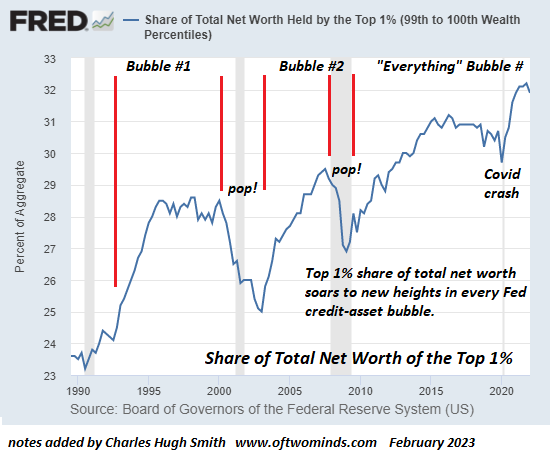While We're Obsessing About the Economy and the Fed, Society Is Unraveling
The market and the government will continue to promote and support a neofeudal status quo until they are forced by society to restore the common good and opportunity.
Of the three primary dynamics of human endeavor--the market, government and society--we focus almost exclusively on the first two. Society is rarely considered as a force of its own. It is implicitly viewed as reactive to the market economy and government, the churning wake left as the market and government chart the course.
In other words, society is secondary to the economy and governance, the venue of fashions, trends, entertainment, culture wars, etc., fodder for media and social media, a reflection of what's happening in the market and government.
As I explain in my book
Global Crisis, National Renewal, this is a misunderstanding of society's role as a force that changes the economy and governance in profound ways.
We give social transformation short shrift because it's not easy to study or understand. Social change is amorphous and doesn't lend itself to quantification like the market or the legal structures of government policy. We end up relying on snapshots such as opinion polls that are inherently limited in scope and accuracy. Respondents tend to give answers they they believe are expected or reflect their views of the moment. Other data is collected from groups that are self-selecting.
Despite these limitations, it's clear that American society is unraveling and undergoing profound changes that will eventually upend markets and governance. We will come to realize society is transforming markets and governance, not the other way around.
Charts of the stock market and economy in the 1960s do not reflect the social changes in values that made the 1960s so tumultuous and consequential. Three social movements--civil rights, the environment and women's rights--all changed the economy and governance in the 1970s, unleashing forces that continue to shape our economy and government to this day.
The market and government didn't lead these changes, social forces changed the market and government. The market and government were perfectly happy to maintain the status quo of rampant industrial pollution and systemic restrictions of civil rights. Society forced economic and political change: the government was forced to enact environmental regulations limiting pollution and industrial waste, and enact legislation removing barriers that enforced an oppressive, unjust, two-tier society and economy.
In the 1970s, these environmental, women's rights and civil rights advances forced on the market and government transformed the economy for the better. Women entered the workforce en masse and women and minorities gained access to institutions that that had previously excluded them. Environmental and efficiency regulations transformed the American economy and landscape from an industrial dumping ground to a much cleaner, more sustainable, more efficient and productive industrial base.
I discussed this recently in
The Forgotten History of the 1970s
and
The 1970s: From Rotting Carcasses Floating in the River to Kayak Races.
Much work remains to be done, of course, but much has been accomplished by the citizenry concluding the status quo is no longer acceptable.
In my analysis, the nation's social fabric is unraveling due to the breakdown of civic virtue, social cohesion and the social contract. The dominance of finance (hyper-financialization) and corporate self-interest (hyper-globalization) has fatally undermined civic virtue, social cohesion and the social contract. Rather than the market serving society, society now serves the market and finance in a painfully obvious two-tiered neofeudal structure in which the few garner the vast majority of the wealth and political power.
Locking in vast private wealth is now the Prime Directive of the elite, an elite which in previous generations understood that every elite ultimately serves at the behest of those they rule (i.e. consent of the governed), and so the elite must apply some of their wealth and power to pursue the common good rather than their own self-interest.
Soaring wealth-income inequality leads to vast concentration of political power. "The people" rule in name only. Any attempt to end the two-tiered neofeudal structure of our economy at the ballot box is futile.
As for the social contract of equal opportunity for all, in the real world, the rungs in the ladder of social mobility have been broken. Those who bought homes and assets a generation or two ago have acquired wealth in a credit-asset bubble economy, while those who borrowed a fortune for a college degree find the value is uncertain or marginal in all but the top-tier of credentials--and connections still matter.
The net result is people are dropping out, opting out or burning out. This is the result of what I call social defeat: the odds are now stacked against all but the super-achievers and the well-connected. Given the instability and inequality of the financialized, globalized "market economy" (heh), a family and home are out of reach financially for many, so they give up. Others see their hard-won gains wiped out by medical expenses (the leading cause of household bankruptcies) or a collapse in the speculative bubble-du-jour. We see the same trends in stagnant economies elsewhere (Japan, for instance): the decline of marriage, family and having children and the abandonment of social / community ties.
As this Wall Street Journal poll reveals, the traditional forces of social cohesion are collapsing before our eyes.
As Peter Turchin has explained, social cycles of integration and disintegration occur every 50 years or so. In integrative phases, people find reasons to cooperate. In disintegrative phases, people find reasons to disagree and fragment into divisive, polarized camps. Clearly, we're well into a disintegrative phase, and what could bring us together is not even visible.
America Pulls Back From Values That Once Defined It, WSJ-NORC Poll Finds (WSJ.com)
The rising emphasis on money reflects the insecurity and instability that characterize the economy. If history teaches us anything, it's that piling up private stashes of wealth can't buy social cohesion, restore the social contract or rebuild social ties. Speculative gain is the ultimate false god. The belief that if we all barricade our own private wealth, everything will be fine is the acme of social dissolution.
We have a great opportunity for national renewal, but there is precious little in the market or governance that offers common ground. The common ground must be found in social changes in what we value and what is no longer acceptable. The market and the government will continue to promote and support a neofeudal status quo until they are forced by society to restore the common good and opportunity.
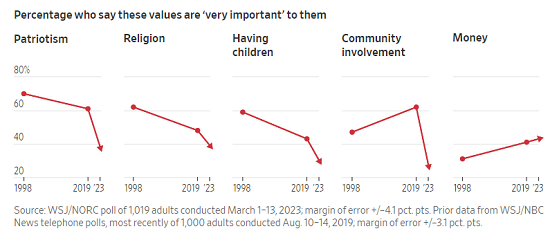

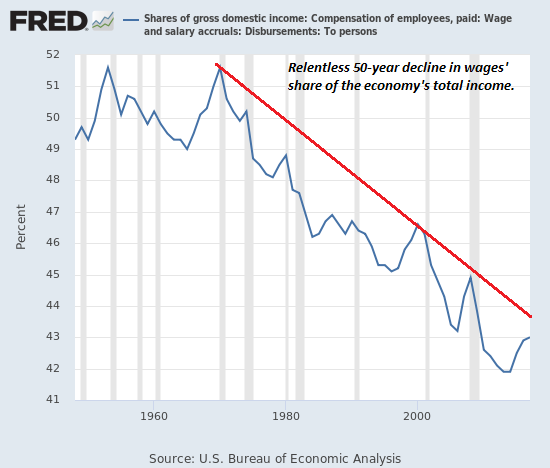
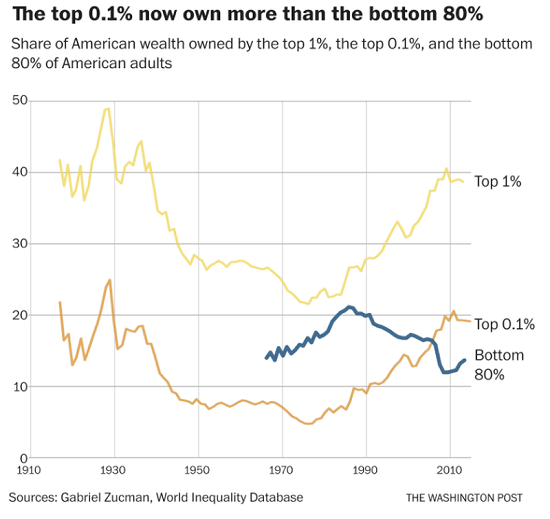
New Podcast:
Turmoil Ahead As We Enter The New Era Of 'Scarcity' (53 min)
 My new book is now available at a 10% discount ($8.95 ebook, $18 print):
Self-Reliance in the 21st Century.
My new book is now available at a 10% discount ($8.95 ebook, $18 print):
Self-Reliance in the 21st Century.
Read the first chapter for free (PDF)
Read excerpts of all three chapters
Podcast with Richard Bonugli: Self Reliance in the 21st Century (43 min)
My recent books:
The Asian Heroine Who Seduced Me
(Novel) print $10.95,
Kindle $6.95
Read an excerpt for free (PDF)
When You Can't Go On: Burnout, Reckoning and Renewal
$18 print, $8.95 Kindle ebook;
audiobook
Read the first section for free (PDF)
Global Crisis, National Renewal: A (Revolutionary) Grand Strategy for the United States
(Kindle $9.95, print $24, audiobook)
Read Chapter One for free (PDF).
A Hacker's Teleology: Sharing the Wealth of Our Shrinking Planet
(Kindle $8.95, print $20,
audiobook $17.46)
Read the first section for free (PDF).
Will You Be Richer or Poorer?: Profit, Power, and AI in a Traumatized World
(Kindle $5, print $10, audiobook)
Read the first section for free (PDF).
The Adventures of the Consulting Philosopher: The Disappearance of Drake (Novel)
$4.95 Kindle, $10.95 print);
read the first chapters
for free (PDF)
Money and Work Unchained $6.95 Kindle, $15 print)
Read the first section for free
Become
a $1/month patron of my work via patreon.com.
NOTE: Contributions/subscriptions are acknowledged in the order received. Your name and email remain confidential and will not be given to any other individual, company or agency.
|
Thank you, Matthew W. ($108), for your outrageously generous contribution to this site -- I am greatly honored by your steadfast support and readership. |
Thank you, Cathy L. ($54), for your marvelously generous contribution to this site -- I am greatly honored by your support and readership. |



















